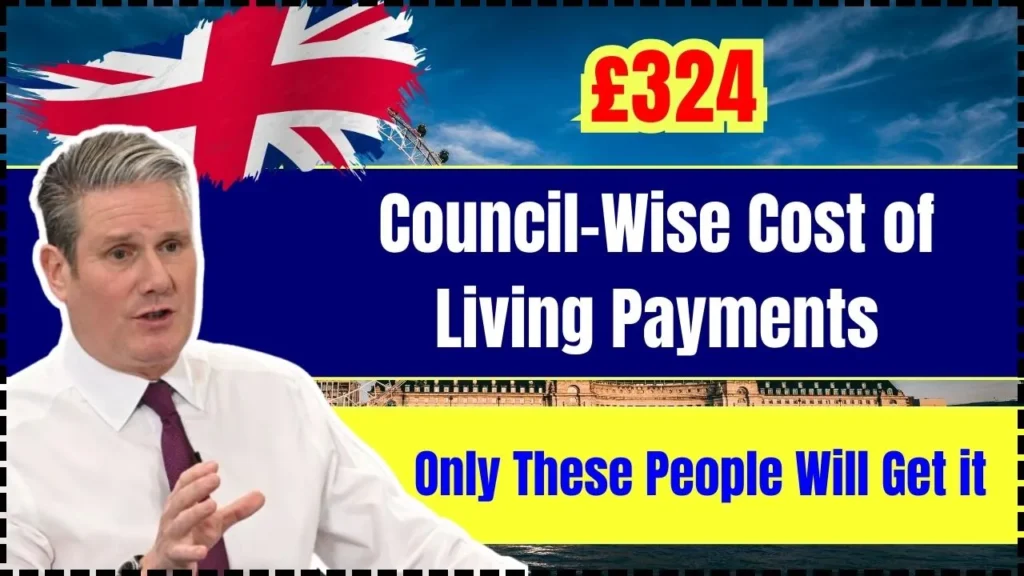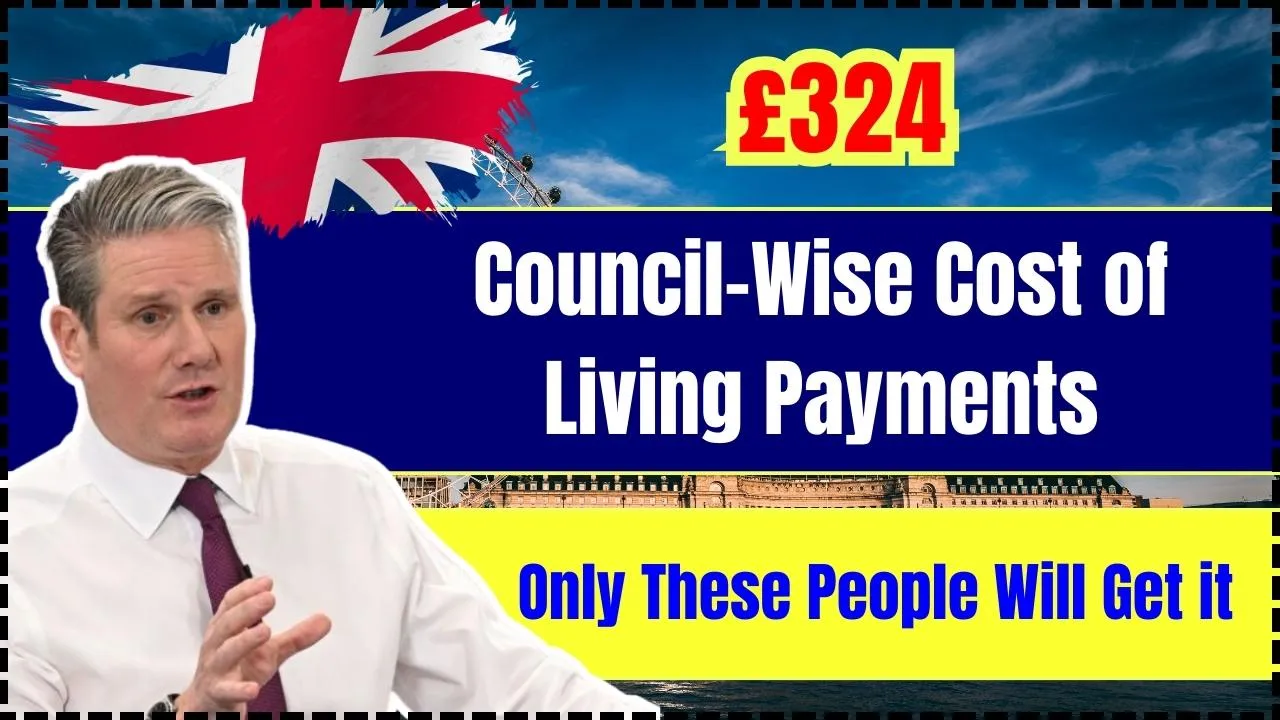In 2025, the UK government is introducing a significant measure to ease the financial pressure on households struggling with the cost of living. The £324 cost of living payment will be made available to certain eligible individuals, but it’s not available to everyone. These payments are designed to support those who are most in need, helping them manage rising living costs. As with any government assistance program, understanding eligibility, application processes, and payment dates is essential to making sure you don’t miss out on this crucial financial help.
The UK government’s £324 cost of living payment is part of a broader effort to address inflation and the financial strain many households face due to increases in energy bills, food prices, and other essentials. These payments will be distributed by local councils, which means the amount and distribution process may vary depending on where you live. This guide will cover everything you need to know about the £324 payment, including who is eligible, how to claim, and key dates to watch out for.
What Are the £324 Cost of Living Payments?
The £324 cost of living payment is a one-off payment designed to help people cover rising living costs. This initiative is part of the government’s wider financial support package for households facing financial hardship due to inflation and increased living expenses. The £324 payment is intended to offer direct relief to the most vulnerable in society, with a focus on those who are already receiving means-tested benefits or are at risk of financial hardship.
These payments are made by local councils, which means the distribution is coordinated differently depending on the area in which you live. While the £324 is the standard amount, certain factors could influence the final amount you receive, such as the number of eligible people in your household or specific local council rules. The council-wise payments aim to provide tailored financial support to individuals and families in need, ensuring that the funds go to the people who need them most.
Who Is Eligible for the £324 Cost of Living Payment?
Eligibility for the £324 cost of living payment is primarily determined by your financial situation. These payments are intended for individuals who are receiving means-tested benefits or who are otherwise financially vulnerable. To qualify, you must meet certain criteria set by the government, but it’s important to note that not everyone will be eligible.
Typically, people who are eligible for the £324 payment include those who are already receiving benefits such as Universal Credit, Pension Credit, Child Tax Credit, or Working Tax Credit. Additionally, people with disabilities or those who are on low incomes may also qualify for the payments. The goal is to support those who are struggling to cover their living costs, particularly in light of the ongoing economic challenges. It’s important to keep in mind that the eligibility requirements can vary slightly from council to council, and local authorities may have additional rules in place.
While the payment is targeted at those receiving means-tested benefits, even if you don’t receive these benefits but are facing severe financial hardship, you may still be able to claim support through local councils or other assistance programs. If you’re unsure whether you qualify, it’s worth contacting your local council or checking their website for specific eligibility criteria.
How to Apply for the £324 Cost of Living Payment
Unlike some government payments that require a formal application, the £324 cost of living payment is automatically issued to eligible individuals who meet the criteria. If you’re already receiving means-tested benefits, you will not need to apply separately. The payment will be processed by your local council and delivered through the usual method you receive benefits, whether that’s via direct deposit, cheque, or another method.
If you are eligible for the £324 cost of living payment but aren’t currently receiving any benefits, you may need to apply for one of the qualifying benefits, such as Universal Credit or Pension Credit, before the cut-off date. This will allow you to become eligible for the payment. The government may also set up a claim period specifically for the £324 payment, which you will need to apply for if you haven’t already been receiving benefits.
In some cases, councils may ask for additional information or documentation to verify your financial situation. If this happens, it’s important to respond promptly to avoid delays in processing your payment.
Payment Dates for the £324 Cost of Living Payment
The £324 cost of living payment is expected to be distributed over a set period in 2025, with different councils having slightly different payment dates based on their own processing schedules. However, the payments are generally expected to be made during specific months of the year, often starting in the spring and continuing through to the autumn.
You should expect to receive the payment as part of your regular benefit payment if you’re eligible. Payments will be automatically transferred to your account, and there will be no need for a manual transfer from the government. Make sure to keep an eye on communication from your local council or check their website to confirm the exact dates when the payments will be issued in your area. The sooner you’re informed, the better prepared you’ll be to manage the funds.
Important Dates to Watch for the £324 Payment
While exact payment dates may vary depending on your location, it is essential to stay informed about the timeline for receiving the £324 payment. Councils typically announce the payment schedule for cost of living payments in advance, and these dates will often be posted on their official websites. It’s also helpful to keep in mind that payment delays are possible, especially if there are any technical issues or if additional documentation is required.

Keep in mind that if you are eligible for other forms of financial support, such as the Winter Fuel Payment or the Warm Home Discount, these payments may also be distributed around the same time, potentially leading to a larger overall payment.
Frequently Asked Questions About the £324 Cost of Living Payment
- When will I receive my £324 cost of living payment? Payment dates will vary by council, but the payment is expected to be distributed during 2025. It is typically part of your regular benefit payment, so check with your local council for exact dates.
- How do I apply for the £324 payment? If you are already receiving means-tested benefits, the £324 payment will be automatically processed and delivered to you. If you aren’t on benefits, you may need to apply for qualifying benefits like Universal Credit or Pension Credit to become eligible.
- How much will I receive? Eligible individuals can receive a £324 payment to help with the cost of living. However, the amount could vary depending on your specific situation or local council rules.
- Who qualifies for the £324 cost of living payment? The £324 payment is available to people who are receiving means-tested benefits like Universal Credit, Pension Credit, or Tax Credits. Other financially vulnerable groups, such as people with disabilities or those in severe financial hardship, may also qualify.
- Is the £324 cost of living payment a one-time payment or ongoing? The £324 payment is a one-time assistance measure in 2025, aimed at helping individuals cope with rising living costs. It is not an ongoing monthly payment.
Conclusion
The £324 cost of living payment is a much-needed financial lifeline for vulnerable households in the UK. This government initiative is designed to help ease the burden of rising living costs, particularly for those on low incomes or receiving benefits. To ensure you receive this payment, it’s important to stay informed about the eligibility requirements, payment dates, and application procedures. By keeping track of official announcements from your local council, you can ensure that you don’t miss out on this essential support. If you are eligible, this payment can help make a significant difference in your financial stability in 2025.

